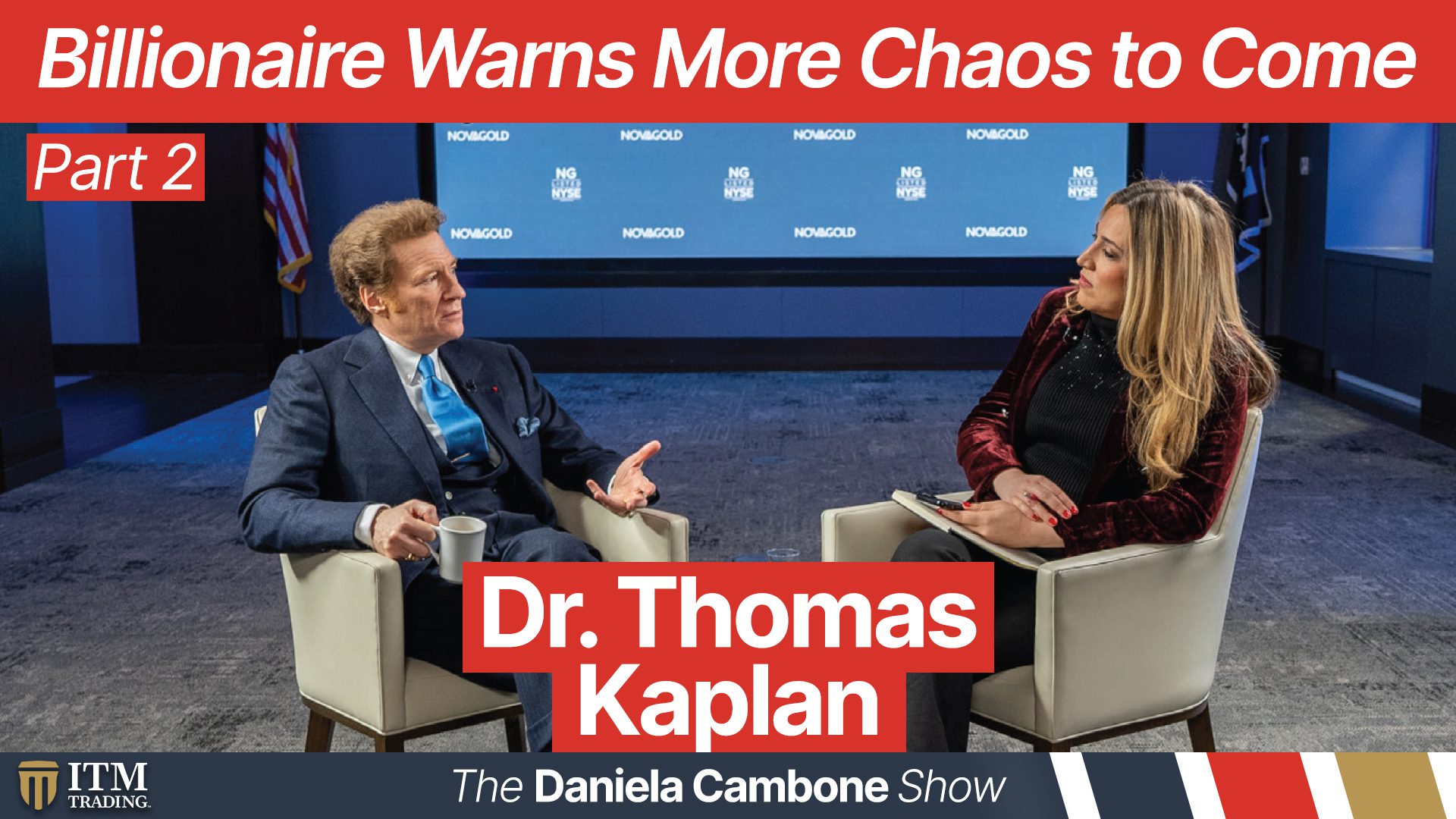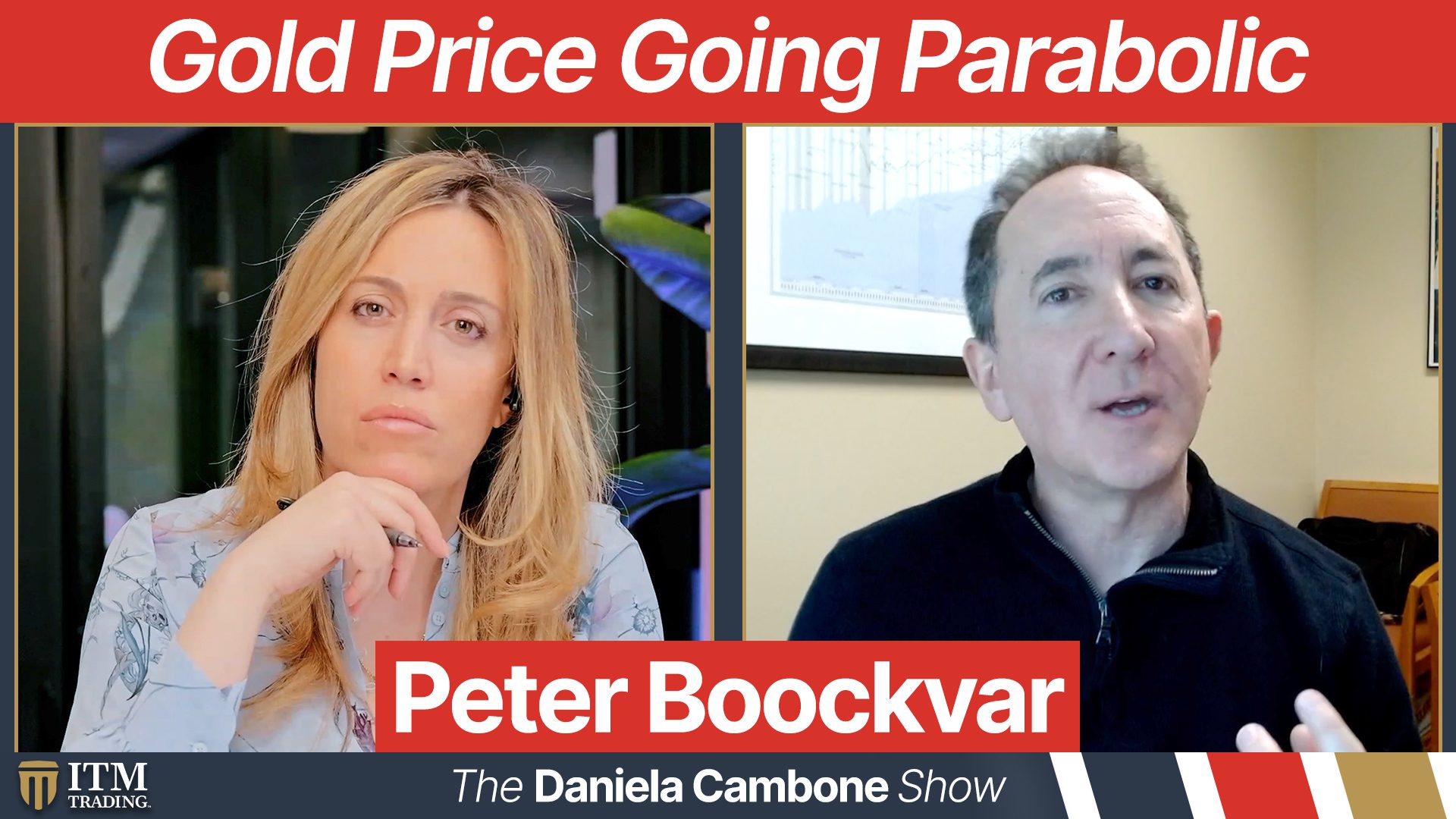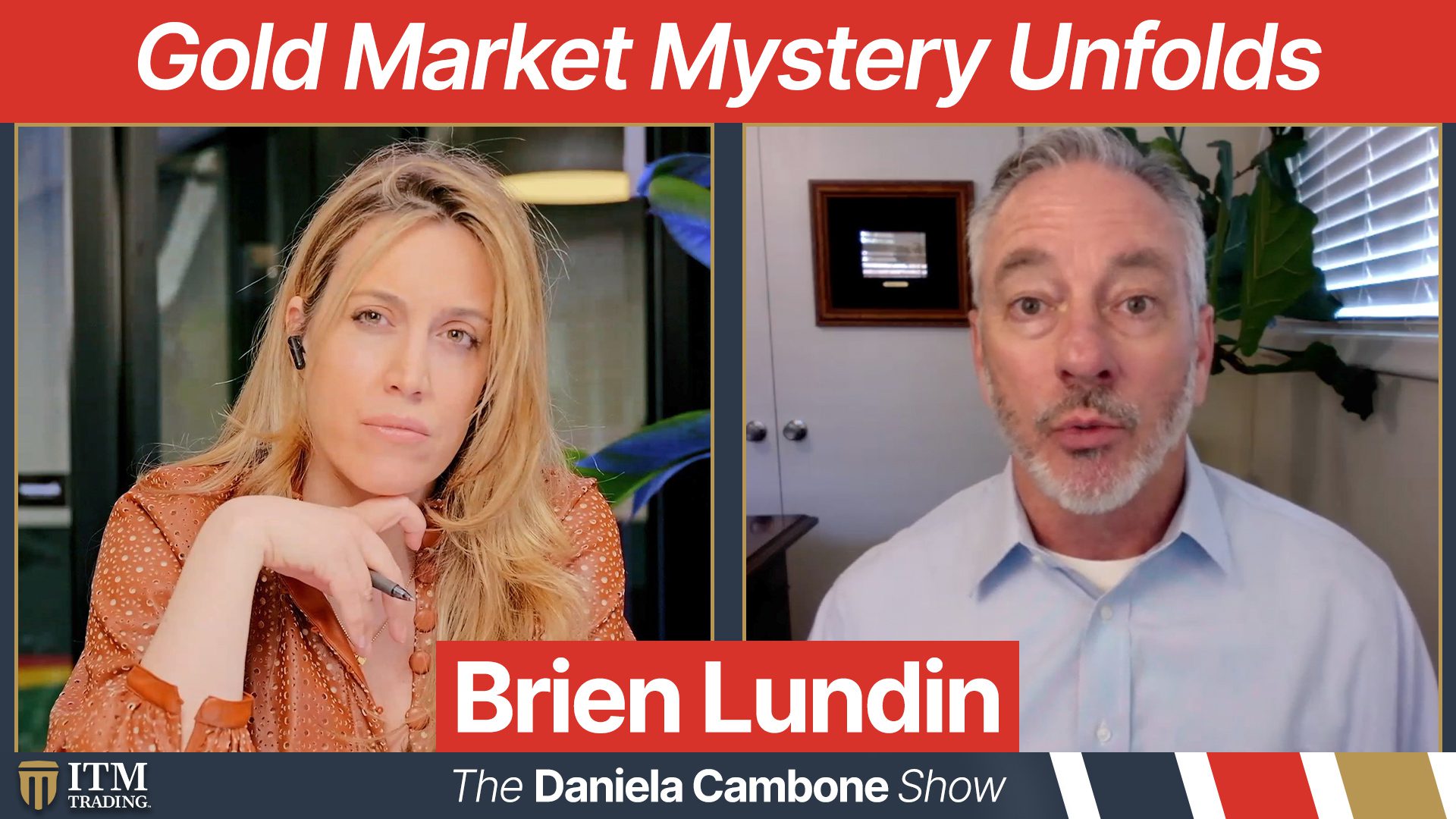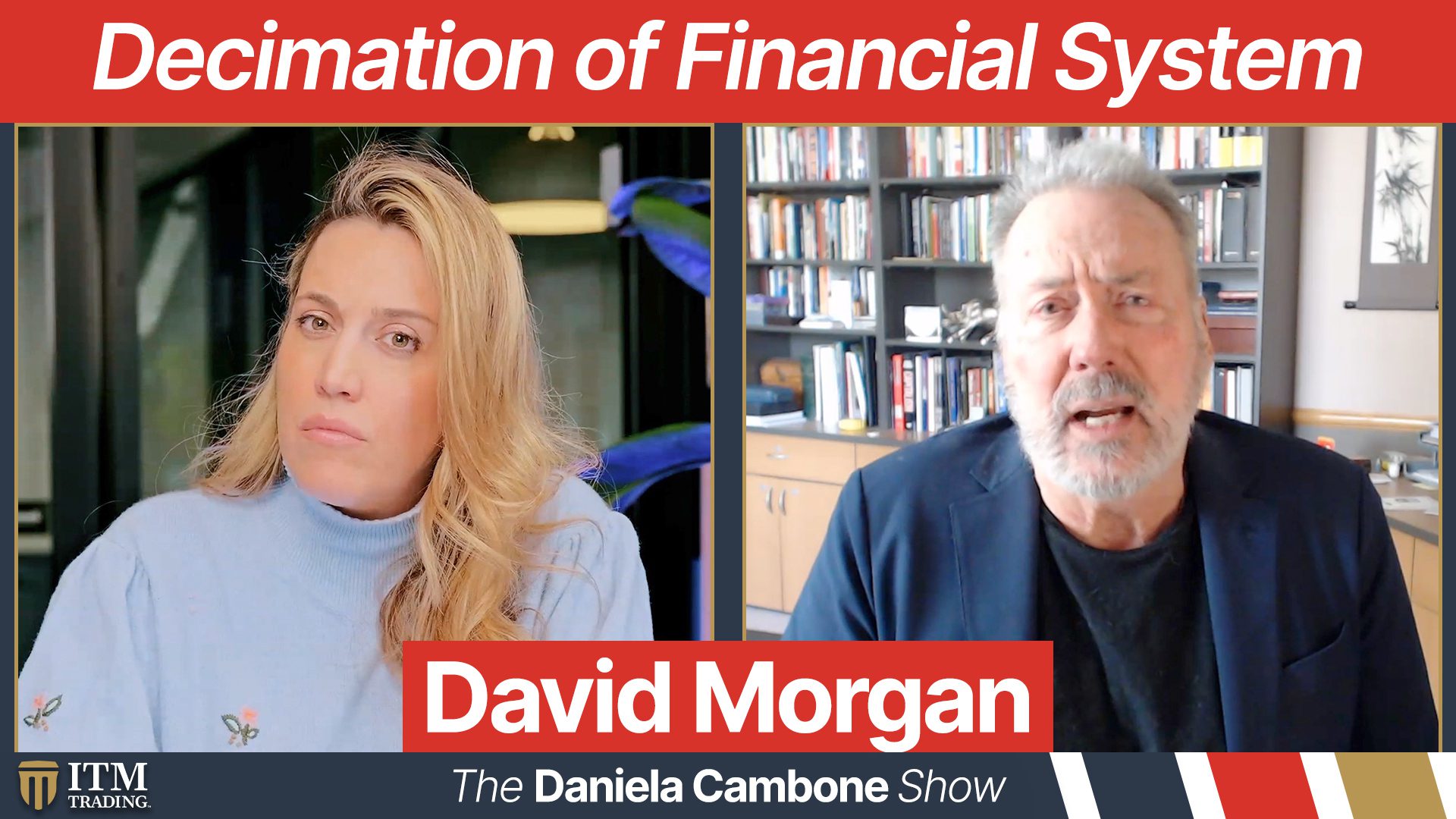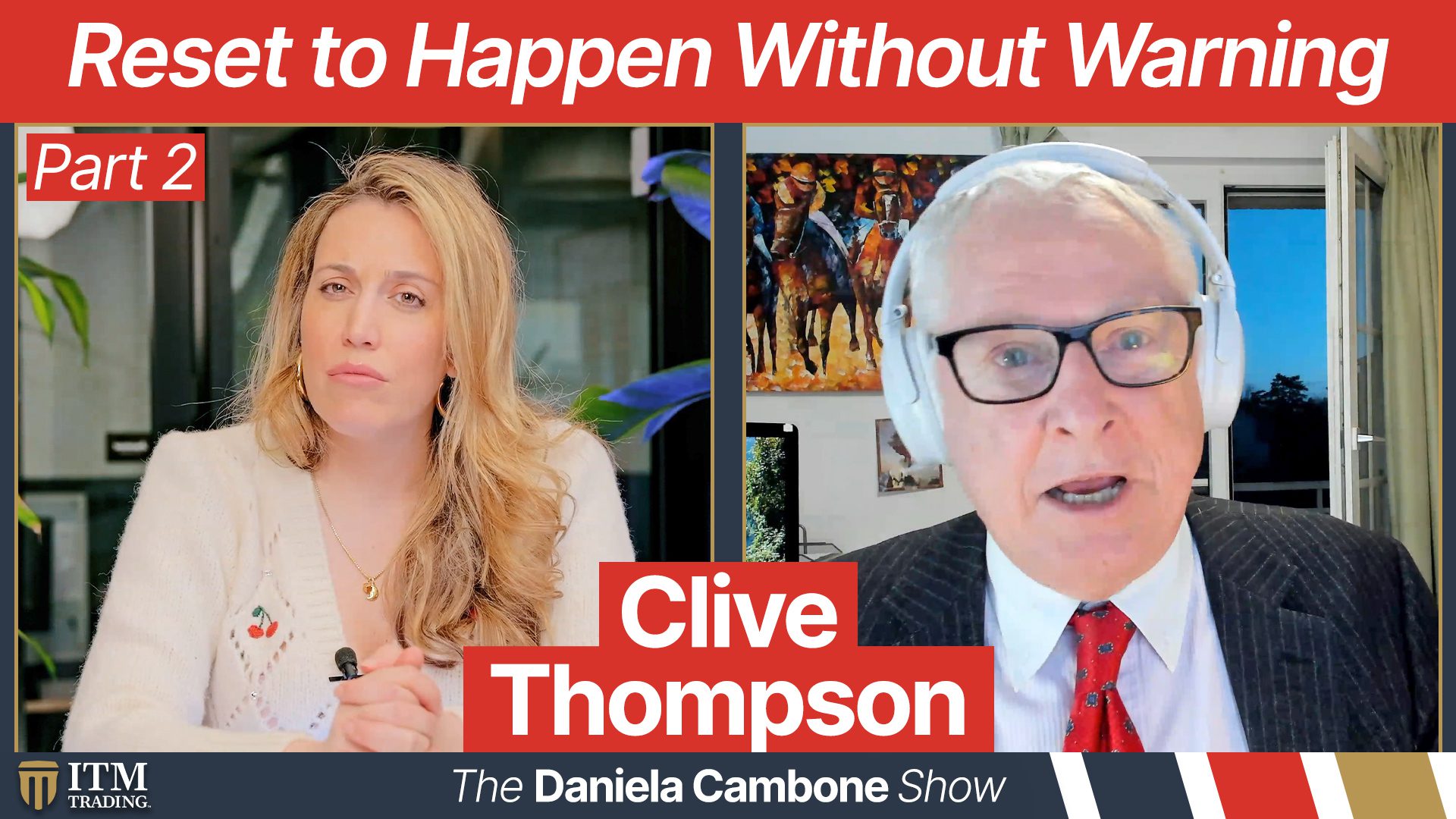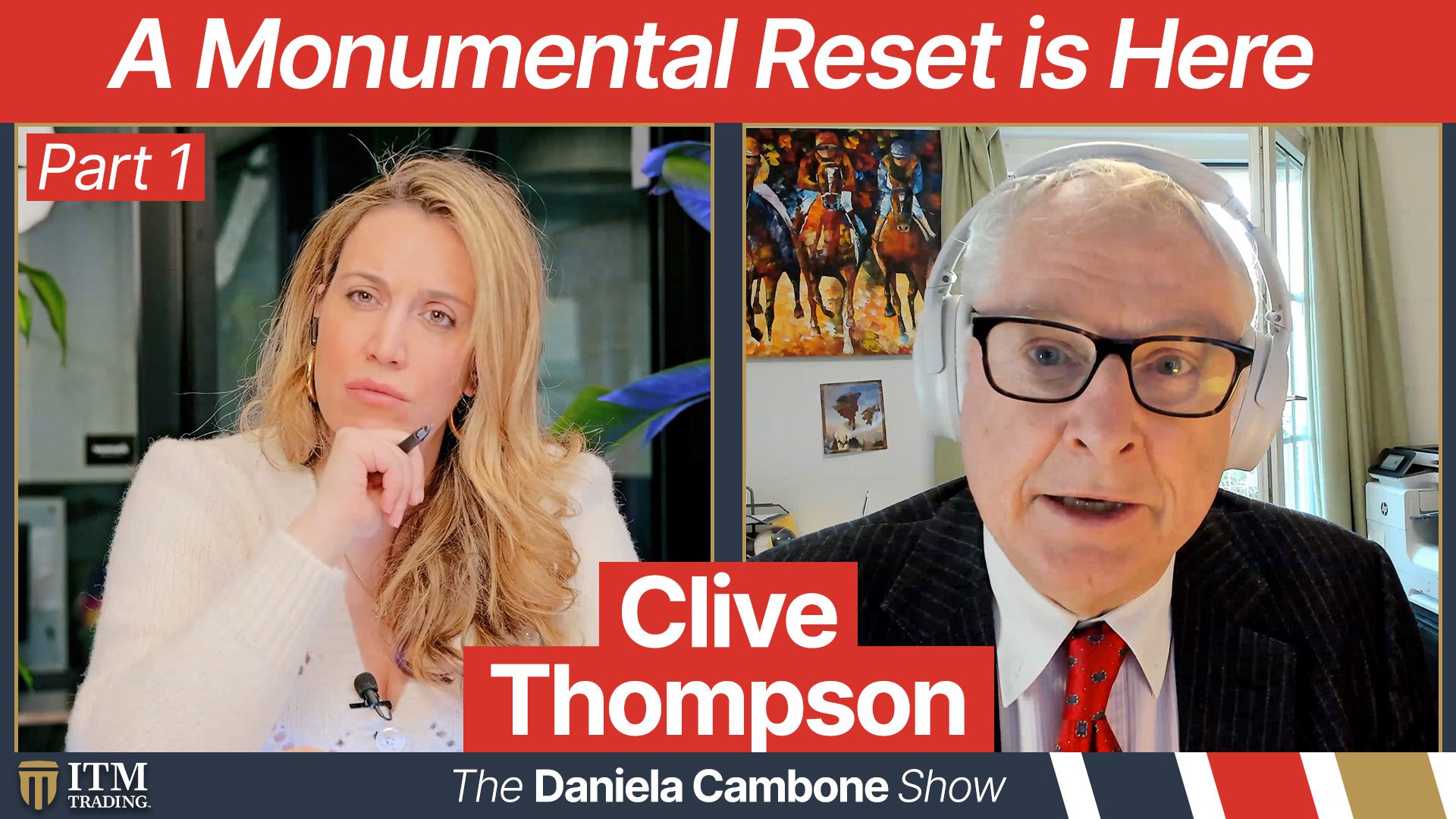Soaring National Debt Can Fast-Track De-dollarization with Riots, Extreme Poverty and War

Don’t miss out on today’s insightful conversation with Daniela Cambone, as Alfonso Peccatiello, founder and CEO of The Macro Compass, delves into the critical issues surrounding the amounting national debt, the devaluation of the U.S. dollar, and the rising trajectory of gold. Peccatiello paints a stark picture of the potential consequences of a soaring national debt and a weakening dollar, cautioning against the notion of an orderly de-dollarization process. With $12 trillion of outstanding debt denominated in dollars outside the US, any dollar appreciation coupled with global economic slowdown spells trouble, Peccatiello explains. Moreover, Peccatiello highlights the significance of gold amid this turbulent financial landscape. What was once $2,200 may soon escalate to $3,000 and beyond, he predicts.
CHAPTERS:
00:00 Biden’s fiscal budget
2:28 Meaning for everyday citizen
3:08 S&P 500 average return
4:03 2025 meltdown
6:43 Dollar system
9:45 Unruly
10:46 America is sick?
12:20 Assets
14:26 Bitcoin
15:46 Gold
19:15 China buying gold
20:18 March Fed meeting
TRANSCRIPT FROM VIDEO:
Daniela Cambone (00:09.934)
Hi, this is Daniela Camponi and welcome back to the Daniela Camponi show here on ITM Trading. Joining me today is Alf Picotiello. He is the founder of the Macro Compass. He also used to manage and was the head of a $20 billion portfolio. Alf, always good to be with you. Welcome back to the show.
Alf (00:29.977)
Hey Danila, such a pleasure to be here.
Daniela Cambone (00:32.938)
Well, I was eager to get you on because I’ve been following you on Twitter. I know your main thesis and what you’re really focused on is the decade of volatility ahead. You believe that macro volatility will continue to dominate the next decade. And I thought this was perfect timing because we just saw President Biden’s fiscal year
2025 budgets. I want to talk about that with you and obviously about the trillions of debt the country finds itself in, all these very light topics. But let’s start with the latest year from President Biden proposing a 7.3 trillion fiscal year 2025 budget that would offset spending on his key domestic priorities, including tax credits for families and new money for housing. But of course, by increasing taxes on corporations and the rich.
your take on the fiscal budget here and what its implications could be here.
Alf (01:32.025)
Why am I not surprised that Biden or any other politician actually would implement more fiscal deficits in the US? Seven trillion to come next year as well. So what’s the playbook here more broadly than Elias that politicians in the US once used to apply fiscal deficits when the economy was weak. So the idea was unemployment rate goes up, the economy’s weak, we’ll apply fiscal deficits, the economy recovers, we’ll tighten the belt a bit.
right, because fiscal deficits can be thought of as injecting new money and resources into the economy, right, you basically cut taxes, you make sure the economy can run hotter. So you need fiscal deficits when the economy is weakening, not when the economy is strong. And actually since Trump in 2016, but now also with Biden, it seems a new era has started. The new era is politicians are gonna use fiscal deficits regardless of economic conditions. They’re just gonna do trillions and trillions and trillions of fiscal deficits.
every single year and that’s different.
Daniela Cambone (02:33.874)
And what does that mean for the everyday citizen, Alf?
Alf (02:38.213)
Yeah, well, what it means is that if you use fiscal deficits every year, regardless of economic conditions, sometimes you’re going to be using fiscal deficits when the economy doesn’t need it. So you’re going to overheat the economy. And also when you get the economy used to this amount of fiscal deficits, when you use it during recession, it isn’t going to be as effective. It basically like a permanent shot in the arm for the US economy that makes it less productive.
Daniela Cambone (02:51.383)
Right?
Daniela Cambone (02:59.127)
Mmm.
Alf (03:04.993)
and makes it more prone to cycles, to a lot of swings of inflation and growth down the road and a lot more volatility upcoming.
Daniela Cambone (03:12.79)
Hence, your thesis of why you expect insane amounts of volatility for the next 10 years.
Alf (03:18.541)
Yeah, look, I mean, if you look in the past at any economy that has tried to use fiscal deficits as a feature of their structure, not as a cyclical way to repair weakness, what you find always is a lot of volatility in growth and inflation. So we have investors have been used to this smooth environment of predictable growth, predictable inflation for the last 10 to 15 years. As a result, the S&P 500 has returned on average
for the last 15 years, over 16% a year. That’s a ridiculous return on average to have for a single stock market investment. A very simple investment in the S&P 500 has quadrupled the money of investors. It’s been smooth sailing, but if you start applying fiscal deficits, regardless of economic conditions, you’re gonna have a much more bumpy road ahead, so investors need to be prepared for that.
Daniela Cambone (04:08.55)
I want to bring up an article I read in a Fortune magazine where they quoted a famous Wharton professor who sees the 34 trillion debt triggering, talking about 2025, he sees a 2025 meltdown as mortgage rates spike above 7%. He says it could derail the next administration to quote, Professor Gomez predicts America’s 34 trillion debt burden may upset the world’s financial markets as early as next year. Should a president elect announce a raft?
of expensive policies. I feel like we’re already hearing that now. He says, quote, and remember the UK’s mortgage meltdown following a disastrous premiership under Prime Minister Liz Truss, that’s on the cards as well. As Gomez said, rates could spiral to 7% or higher if the topic is swept under the rug by Washington. Do you agree with this thesis, Alf?
Alf (04:58.685)
Partially, I think there are good points made there, Daniella. The good points are that if you keep using fiscal deficits to this extent every year, even if the economy is still running relatively hot, what you risk is that inflation picks up again. And if inflation picks up again, Daniella, we know what Powell is going to do. The guy is going to retire soon, right? So his legacy, he doesn’t want his legacy to be of a guy that let inflation run loose. He wants to be Volcker, not Arthur Burns.
Daniela Cambone (05:23.551)
Right.
Alf (05:26.053)
So he will try to react and tighten again. When he tightens again and mortgage rates are already at 7%, where is he gonna send his mortgage rates? Where is he gonna send his corporate borrowing rates to 7 to 8% and so more corporates and more households over time will be forced to face these higher and higher interest rates and that’s bound to break the economy at some point. So it might seem that this fiscal deficit helps the private sector.
But if you instead use it at the wrong time, you only increase the inflation risks, you increase the reaction of the Federal Reserve, and ultimately you will hurt the consumers. So I think there is a risk there. Where I don’t agree necessarily is this UK comparison. Because the US issues the global reserve currency of the world, that’s the dollar. Everybody needs dollars, everybody wants dollars. In Brazil, they’re selling soybeans in dollars. In China, they’re selling goods and services.
Daniela Cambone (06:18.606)
Thank you.
Alf (06:20.469)
in dollars, we have built a system around the dollar. We haven’t built a system around the British pound, the sterling. So that’s why when you play with fire in the UK, you get these bond vigilantes reactions. They’re much harder to get in the US, but what you could get is inflation instead in the US.
Daniela Cambone (06:37.694)
And I know this is a divergent path, but I, and to your point about, and very valid point on the UK, but about the system built around the U S dollar, could we see a divergence there though, Al? We’ve already seen a pivots away from that. I mean, perhaps this will usher in a new era.
Alf (06:53.041)
Mm-hmm. Yeah, look, what the dollar will do in that case, it’ll suck the system, it will deleverage the system, it will force everybody who has borrowed in dollars, as interest rates go up in the US, as inflation goes up in the US, it will make the dollar strengthen because the cost of debt that has been issued in dollar will move up. And so all these companies outside the US that have borrowed in dollars will have a very hard time repaying their dollar liabilities.
So the dollar will work as a black hole that will suck and de-leverage the entire system until it basically is forced to implode and then we need an alternative. So the way to break the dollar system, funnily enough, Daniela, isn’t an orderly way where you slowly walk away from the dollar. If you want to break the system based on the dollar, you have to face the monster in the eye, make the dollar suck the system, de-leverage the system like a black hole. It’s a very…
disruptive force, it’s not an orderly unwind. But it might happen as a result of higher interest rates, higher inflation, pushing all the indebted countries and companies in dollar outside the US, force them to repay their dollar debt, to deleverage, to shrink their balance sheet, and basically to destroy the system from the within. But it is not an orderly de-dollarization.
Daniela Cambone (08:11.006)
Yep. But I think, but I think it’s interesting, Alf, you say now you think it could, you think it could happen. There’s a possibility that could be the likelihood.
Alf (08:20.753)
Look, it could happen. And if you think of ways you can break a global reserve currency system, look at the past. How have we done that? Normally with disruptive events, with wars, with a system breaking from within. Think of the Roman Empire, for example. It broke from within. Think of other global reserve currencies. They basically fell because they lost the war. So there are always disruptive elements in breaking the global reserve currency. My point is, yes, it could happen.
Daniela Cambone (08:36.471)
right.
Alf (08:49.549)
I’m not sure whether in the next 10, 20 or 50 years, but my main point is it isn’t going to be orderly. It’s not going to be this fairy tale where you dethrone the dollar and everyone is happy. It will be a disastrous type of setup where the system has to implode from within. Why? We have $12 trillion of outstanding debt that has been issued from entities, countries, companies outside the US, Danila. So they issue dollar debt.
Daniela Cambone (08:59.126)
I’m going to go to bed.
Alf (09:17.541)
they lever up, they borrow in dollars, but they can’t get their hands on dollars. They cannot unless they’re selling goods, they’re selling services, they’re selling commodities in dollars. So what happens when the dollar appreciates and the global economy slows is that your debt that are denominated in dollars, they go up in value. So you have to pay more to service your debt. But what about your assets? What about your cash flows? If you’re not selling stuff because the economy is slowing down, you’re in trouble.
And that’s why during periods of crisis we see the dollar appreciating.
Daniela Cambone (09:51.414)
Like I said, I didn’t mean to diverge and go on this path, but how can I not ask you this now? When you say unruly, I mean, are you talking riots on the street? Are you talking extreme poverty or hyperinflation or super deflationary or war? What does unruly mean for you?
Alf (10:11.113)
All these five possibilities are a chance because again, you need a disruptive environment. You need something that disrupts the system from within. So it could be extreme deflation because that basically increases the value of debt. If you have deflation, the real value of your debt goes up. It could be high, high inflation prolonged for a period of time, forces the Federal Reserve to raise interest rates, which again, breaks the system from within.
Or it could be another type of event like, you know, we had a pandemic and then authorities came in and did fiscal deficits and reacted. What if we have a war or anything like that?
Daniela Cambone (10:44.897)
Right.
Daniela Cambone (10:49.938)
I want to get back to talking about, obviously, the volatility and the national debt. And I want to just bring up one tweet from our friend Robert Kiyosaki, author of Rich Dad Poor Dad. He just said, you know, debt increasing by one trillion every 90 days. America’s sick. Prepare now. His solution is gold, silver, Bitcoin. Please take care. So two things I want to hone in on here. One, I want to know your thoughts on…
Would you, do you agree with the statement that America’s system is broken, that America is sick? And two, I want to know your solutions for the current monetary environment we find ourselves in. So one, is America truly sick, Alf?
Alf (11:29.429)
The answer is no, America isn’t sick. I think America is very productive, is one of the economies that is the center of excellence for technological production, for example. Think of artificial intelligence right now, for instance, but the policy making mix that we are applying right now is completely irrational and very risky. So this permanent use of fiscal deficits, which seems to be this easy win for politicians, Daniela, they think…
Let’s throw money at the economy year after year. Let’s win elections this way. This is very risky. But structurally, the US economy is pretty sound. It’s productive. Americans are hard workers and companies are productive. I mean, think of artificial intelligence. Think of all the tech companies that were founded in the US. But if we keep applying this policy making mix that is very risky and irresponsible, this could ruin the entire texture of the US productive system.
Daniela Cambone (12:24.926)
Second point, what assets are you liking right now, Alf?
Alf (12:29.317)
So I think that what has happened is that investors have completely thrown in the towel on a recession. Recession was priced at 30 to 40% chance after the banking turmoil in 2023. And now if I look at the bond market, which I track very closely, the bond market is now pricing only a 10% chance of a recession over the next 12 months, only 10%, okay? So 10% isn’t zero, but it’s a very low probability price in markets today. And instead, if you look at where the economic cycle is going, as we speak,
you start to see the first signs that there is some potential weakness in the labor market. If you see the amount of full-time jobs that are being added by the U.S. economy, it is coming down. If you see the amount of jobs added by the cyclical sectors of the economy, the ones more reactive to how the economy is doing, cyclical industries like manufacturing, transportation or trade, they are not really hiring anymore. So you are seeing the first signs, right, that the hiking cycle of the Fed is playing a bit of its weakening role on the economy. Yet, yet.
bond markets are not believing anymore into a recession. So right here, I think you have this opportunity of looking at this front end of the bond market, two to five year bond yields are still offering north of 4% yields that investors can look at, lock them in, and what they offer is this optionality that if the situation deteriorates, you are making money on these bonds you bought, and when there is blood on the streets, or as Warren Buffett used to say, when people are fearful,
then you have an opportunity to be greedy. But right now, people aren’t fearful. Right now, the market is greedy. Right now, you have NFTs of penguins and monkeys being bought for half a million dollars each. You have strange meme coins going up 9,000% over the weekend. It’s full animal spirits. When it’s full animal spirits, you’re supposed to be more careful.
Daniela Cambone (14:16.69)
animal spirits.
Well, let’s talk a little bit more on that animal spirits and the run in Bitcoin. I mean, the ETF seems that has opened the floodgate here for the price action in the US, now news coming out of the UK. I want to get your thoughts about the rush into Bitcoin, obviously making all time highs here.
Alf (14:39.885)
Yeah, it’s a great expression of animal spirits, Danila. So what’s happening is that the market is looking at stuff like 90, 95 or 2007 or 1999. They’re looking at the situation where the Federal Reserve has raised rates and also in 1999 and 2007, interest rates were over 5%, like today. The Fed has raised rates, but the economy seems to be able to handle it. So people are like, whoa, let’s go, something has changed.
I can now put risk at work, I feel more confident. And they’re looking at their neighbors getting richer. This is a concept that I’m very, I mean, they’re looking at something I would call the neighbor tracking error. So tracking error is this concept in finance where, ah, you’re tracking the benchmark, but there is an error, and you are now having a neighbor tracking error. Your neighbor has NVIDIA, your neighbor has other AI driven stocks, he has Bitcoin, you don’t. So what? So you’re gonna chase him.
Daniela Cambone (15:15.252)
Exactly.
Alf (15:36.933)
You’re gonna feel poor and you wanna chase what your neighbor is doing, right? And everybody’s piling into the same animal spirits behavior even if they have an alternative. They have an alternative, it’s 5% risk-free interest rates. Nobody cares. So this is animal spirits.
Daniela Cambone (15:51.506)
How about in the gold market? I mean, obviously also making new highs, silver as well, but your take, your take on gold.
Alf (15:56.954)
So I mean…
I mean, I like gold more from, let’s say, a monetary perspective than I like Bitcoin. I have a valuation framework on gold, Daniele, and what I do is the following. Look, gold for centuries has been considered an alternative, a coexistent alternative to fiat money. Okay? So then, how do I value the price of gold? Is $2,000 enough or is $2,500 the fair price for gold? So what I do is I take all the gold on Earth,
Okay, and I apply the price of gold on top of it. So I calculate the market capitalization of the gold market. How much is the gold market worth and value today? The answer is about $7 trillion as we speak, okay? That’s price of gold times the amount of gold on earth. It’s worth about $7 trillion. Should it be worth more or less, Danila? Well, it’s pretty simple. How does that $7 trillion worth of gold compare to the amount of fiat spendable money in the system?
How much fiat money is out there in the five largest economies in the world? And the answer is $35 to $40 trillion. So the valuation of gold is about 20% of the valuation of the fiat money in existence in the five largest economies in the world. And if you look at this ratio, it has always been around 20%. Investors have always valued gold as a good alternative to fiat money, priced at about 20% of the fiat money in existence in the five largest economies in the world.
If you do that math today, the price of the fair value of gold is about 22 to $23,000 per ounce. Now, wait a second. If you do 20% of the fiat money in existence, the fiat money in existence goes up over time and up and up. And we print every time new money, right? We make new debt, we print new money. So if this denominator goes up over time, then also the price of gold will.
Alf (17:54.257)
climb over time to maintain this 20% ratio that I calculated. So basically in five years from now, the fair value of gold, if we keep printing fiat money, won’t be 2,200 anymore, it will be 3,000, and so on and so forth and so on and so forth. That’s why gold appreciates over time, because it’s a hard asset that is priced as an alternative to this fiat money that we keep printing over time.
Daniela Cambone (18:19.77)
Right. So you just made a bullish case for gold.
Alf (18:23.585)
Over time, yes, if you’re a patient investor and you are looking five to 10 years ahead, gold is likely to trade above 2,500, possibly at $3,000 in about a decade from now. Of course, gold shouldn’t be the only thing you own in a portfolio, because gold does not produce cash flows. There will be certain type of stock investments that are solid companies, not leveraged, they are reliable, they have good business models, and they will produce cash flows over time.
Daniela Cambone (18:26.562)
Mm-hmm.
Alf (18:51.769)
that gold deserves a role in a portfolio because not only it has this property of being prized as an alternative to fiat money and it appreciates over time, but it’s also a hedge. Because if ever this fiat money system gets challenged, gold is in the primary position to be the new monetary reference asset because it already sits at the epicenter of our system. All the largest central banks in the world own gold. All the largest governments in the world own gold. So it will play that role again.
Daniela Cambone (19:20.498)
And we just saw more China buying, right, of gold.
Alf (19:23.245)
Well, I mean, I think China has just looked at what happened to Russia, to be frank, with their reserves in 2021, I think. So, I mean, 2022. So what like what would you do? Like if you have accumulated like China, a large amount of foreign reserve assets because you have sold your goods and your services and your commodities, what would you do? Would you keep them all in bonds or would you also buy some gold? I would buy some gold as well.
Daniela Cambone (19:46.942)
No, absolutely. Absolutely. I just, I just, I probably, I think that the numbers are actually even higher than what they’re, uh, what they’re, they’re showing.
Alf (19:57.665)
Yeah, I mean, if you look at what China has done with the reserves, a lot of countries have them in bonds, but China has been a bit smarter. They have a portion in bonds, but they also have invested in hard assets in other countries. For example, they’ve invested a ton of money in real estate projects in Africa or in other continents in other countries. So they’ve invested in hard assets in other countries and probably they own more gold than they state.
Daniela Cambone (20:04.407)
Mm-hmm.
Daniela Cambone (20:22.81)
I want to just, sorry, I want to wrap with what, you know, we started talking about Powell and the Fed. I want to wrap with what you think we’ll see from the March meeting here, Alf. Any surprises we can expect from the Federal Reserve?
Alf (20:40.785)
Yeah, butterflies and rainbows. So they’re going to come up and say that it’s all fine and dandy. And one thing maybe is going to change. They’re going to say that the neutral rate is higher. So if you hear these words, it basically means that the Fed thinks this time is different. The US economy can handle 4% or 5% rates forever. Something has structurally changed, which often it isn’t the case. This time is different. Very expensive words in finance to use. So I think they
Daniela Cambone (20:43.086)
Ha ha ha!
Alf (21:10.633)
and calm down guys, we’re not gonna cut five, 10, 15 times. We’re only gonna do three cuts this year, maybe a couple more next year and that’s it. Because the neutral rate is higher. So prepare to handle mortgage rates at six and 7% for the foreseeable future. That’s what they’re gonna try and say.
Daniela Cambone (21:19.97)
That’s it.
Daniela Cambone (21:27.294)
Well, you know what’s interesting off talking about rainbows and butterflies? Because I saw the CME, the Chicago Mercantile Exchange, data shows the probability of the Fed keeping rates unchanged on March 20th is as high as 97% interest rates in the US are currently 5.5%, where have they been since July 2023. But now consumers are doubting that the Fed can achieve its inflation goals anytime soon. This is according to a survey from the New York Federal.
So consumers now doubting that the Fed can meet its goals, Alf.
Alf (22:04.781)
And that’s another reason why the Fed has to play tough. And they have to say, wow, we’re not gonna cut to 2% rates, forget that. That’s not the thing anymore, guys, because you’re so strong, right? And you can handle it. So we’re gonna keep rates above 4% for the next few years. You guys can handle it. The neutral rate is higher. That’s what you’re gonna hear.
Daniela Cambone (22:10.591)
Yeah.
Daniela Cambone (22:19.33)
Right.
Daniela Cambone (22:24.306)
Alf Picatello, really good thoughts, but the future does not seem rosy. Is that a good summary?
Alf (22:32.433)
I would say that investors have to be more prepared for macro volatility ahead, a lot more macro volatility ahead. People have had such a smooth ride for the last 10 years, and I talk to investors and they say, well, what’s the problem? I can just buy the S&P and they will make 10% plus a year for me. It’s going to be a smooth ride. Well, I think they should be prepared for much more macro volatility.
Daniela Cambone (22:42.817)
Yeah.
Daniela Cambone (22:55.286)
Alf, where can folks find more of your stuff? Where can we read more about your insights here?
Alf (23:00.105)
So the most interesting project I have is that I’m opening my own macro fund. That’s because I see all these opportunities popping up, Daniel, and I think investors should be more prepared for macro volatility. So that’s my next endeavor. As you said, I already run $20 billion for a large European bank. I think now it’s the time to exploit these opportunities again. So if people are interested to hear more about what this fund does, receive the fund memo that explains everything about the fund, a simple email.
to fund at themacrocompass.com and I will reply with all the information needed.
Daniela Cambone (23:34.25)
There you go. Alf Picatielo, we will see you soon. And speaking about how to prepare for the volatility and crafting a strategy, feel free to reach out to one of my associates over at ITM Trading. You can book a strategy conversation. It’s fantastic experience at the link below in the description and someone will reach out to you. And don’t forget to sign up at danielecomboni.com so you don’t miss a beat on all this incredible content and interviews.
folks like Alf, and we’ll see you soon. Thanks for tuning in.
SOURCES:
https://twitter.com/MacroAlf
https://finance.yahoo.com/news/hotshot-wharton-professor-sees-34-110000414.html
https://www.axios.com/2024/03/11/biden-budget-2025-priorities-plans-credits
https://www.cmegroup.com/markets/interest-rates/cme-fedwatch-tool.html
